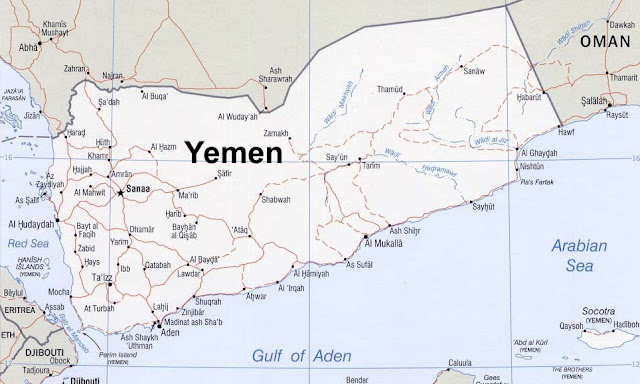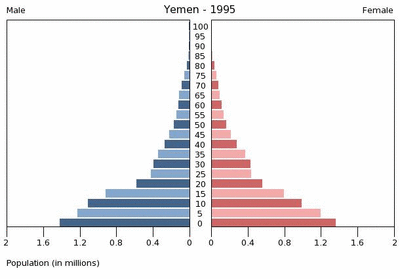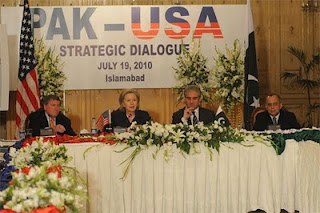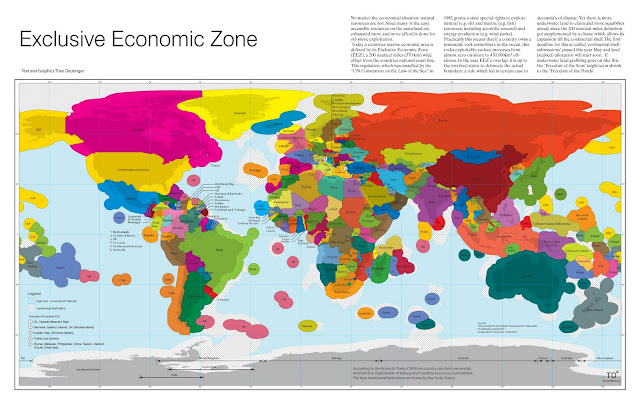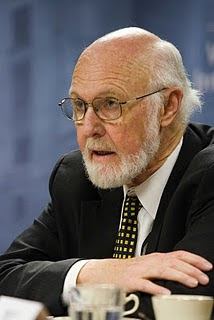-
Demographics, Depleted Resources, and Al Qaeda Inflame Tensions in Yemen
›July 21, 2010 // By Schuyler NullA second spectacular Al Qaeda attack on Yemeni government security buildings in less than a month is a worrisome sign that the terrorist group may be trying to take advantage of a country splitting at the seams. U.S. officials are concerned that Yemen, like neighboring Somalia, may become a failed state due to a myriad of challenges, including a separatist movement in the south, tensions over government corruption charges, competition for dwindling natural resources, and one of the fastest growing populations in the world.
Wells Running Dry
Water shortages have become commonplace in Yemen. Last year, the Sunday Times reported that Yemen could become the first modern state to run out of water, “providing a taste of the conflict and mass movement of populations that may spread across the world if population growth outstrips natural resources.”
Earlier this year, government forces came to blows with locals over a disputed water well license in the south. Twenty homes were damaged and two people were killed during the resulting eight day stand-off, according to Reuters.
The heavily populated highlands, home to the capital city of Sanaa, face particularly staggering scarcity. Wells serving the two million people in the capital must now stretch 2,600 – 3,200 feet below the surface to reach an aquifer and many have simply dried up, according to reports.
Yemeni Water and Environment Minister Abdul-Rahman al-Iryani told a Reuters reporter that the country’s burgeoning water crisis is “almost inevitable because of the geography and climate of Yemen, coupled with uncontrolled population growth and very low capacity for managing resources.”
Nineteen of Yemen’s 21 aquifers are being drained faster than they can recover, due to diesel subsidies that encourage excessive pumping, loose government enforcement of existing drilling laws, and growing population demand. Qat farmers in particular represent an excessive portion of water consumption; growing the popular narcotic accounts for 37 percent of agricultural water consumption. Meanwhile, according to a study by the World Food Programme this year, 32.1 percent of the population is food insecure and the country has become reliant on imported wheat.
Yemen’s other wells – the oil variety – have long been the country’s sole source of significant income. According to ASPO, oil has historically represented 70-75 percent of the government’s revenue. But recent exploration efforts have failed to uncover significant additions to Yemen’s reserves, and as a result oil exports have declined 56 percent since 2001. The steep decline has pushed Yemeni authorities to look to other natural resources, such as rare minerals and natural gas, but the infrastructure to support such projects will take significant time and money to develop.
The Fastest Growing Population in the Middle East
Despite the country’s limited resources, Yemen’s population of 22.8 million people is growing faster than any other country in the Middle East. According to projections from the Population Reference Bureau, by 2050, Yemen’s burgeoning population is expected to rival that of Spain.
Fully 45 percent of the current population is under the age of 15 – a troubling ratio that is expected to grow in the near future. The charts from the U.S. Census Bureau embedded below illustrate the dramatic growth of the country’s youth bulge from 1995 through 2030.
A poor record on women’s rights and a highly rural, traditional society contribute to these rapid growth scenarios. According to Population Action International’s Elizabeth Leahy Madsen, only 41 percent of Yemeni women are literate and their total fertility rate is well over the global average. A recent survey from Social Watch ranking education, economic, and political empowerment rated Yemen last in the world in gender equity. Yemeni scholar Sultana Al-Jeham pointed out during her Wilson Center presentation, “Yemeni Women: Challenges and Little Hope,” that there is only one woman in a national parliament of 301 members and that ambitious political women routinely face systematic marginalization.
A contributing factor is that 70 percent of Yemen’s population live outside of cities – far more than any other country in the region – making access to education and healthcare difficult, especially in the large swaths of land not controlled by the government.
External migration from war-torn east Africa adds to Yemen’s demographic strains. According to IRIN, approximately 700,000 Somali refugees currently reside in country, and that number may grow as the situation in Somalia continues to escalate. Within Yemen’s own borders, another 320,000 internally displaced people have fled conflict-ridden areas, further disrupting the country’s internal dynamics.
Corruption and Rebellion
Competition over resources, perceived corruption, and Al Qaeda activity have put considerable pressure on the Saleh regime in Sanaa. The government faces serious dissidence in both the north and the south, and the Los Angeles Times reports that talk of rebellion is both widespread and loud:Much of southern and eastern Yemen are almost entirely beyond the central government’s control. Many Yemeni soldiers say they won’t wear their uniforms outside the southern port city of Aden for fear of being killed. In recent months, officials have been attacked after trying to raise the Yemeni flag over government offices in the south.
USAID rates Yemen’s effective governance amongst the lowest in the world (below the 25th percentile), reflecting Sanaa’s poor control and high levels of corruption. Some reports claim that up to a third of Yemen’s 100,000-man army is made up of “ghost soldiers” who do not actually exist but whose commanders collect their salaries and equipment to sell on the open market.
The West and Al Qaeda
In testimony before Congress earlier this year, Assistant Secretary of State Jeffrey Feltman called on the Yemeni government to take a comprehensive approach to “address the security, political, and economic challenges that it faces,” including its natural resource and demographic challenges.
The Yemeni government is poised to receive $150 million in bilateral military assistance from the United States. But some experts are critical of that approach: Dr. Mustafa Alani of the Dubai-based Gulf Research Center told UN Dispatch that, “you are not going to solve the terrorist problem in Yemen by killing terrorists,” calling instead for investing in economic development.
USAID has budgeted $67 million for development assistance, economic support, and training programs in Yemen for FY 2010 and has requested $106 million for FY 2011 (although about a third is designated for foreign military financing).
While Yemen’s Al Qaeda presence continues to captivate Western governments, it is the country’s other problems – resource scarcity, corruption, and demographic issues – that make it vulnerable to begin with and arguably represent the greater threat to its long-term stability. The United States and other developed countries should address these cascading problems in constructive ways, before the country devolves into a more dangerous state like Somalia or Afghanistan. In keeping with the tenets of the Obama administration’s National Security Strategy, an exercise in American soft power in Yemen might pay great dividends in hard power gains.
Sources: Association for the Study of Peak Oil – USA, Central Intelligence Agency, Congressional Research Service, Guardian, IRIN, Los Angeles Times, New York Times, Population Action International, Population Reference Bureau, ReliefWeb, Reuters, Social Watch, Sunday Times, U.S. Census Bureau, U.S. Department of State, UN Dispatch, USA Today, USAID, World Food Programme.
Photo Credit: “Yemen pol 2002” via Wikimedia Commons courtesy of the U.S. Federal Government and “Yemen youth bulge animation” arranged by Schuyler Null using images courtesy of the U.S. Census Bureau’s International Data Base. -
In Pakistan, Clinton Calls for Human Security; USAID’s Shah Commends Birth Spacing
›July 20, 2010 // By Russell Sticklor In Islamabad yesterday, Secretary of State Hillary Clinton acknowledged longstanding Pakistani concerns that the U.S.’s ongoing mission in the country is solely military in nature. However, Clinton asserted at the opening of the second U.S.-Pakistan Strategic Dialogue that the “future demands a comprehensive human security, a security based on the day-to-day essentials like jobs, schools, clinics, food, water, fuel, equal access to justice, [and] strong, accountable public institutions.” To that end, she announced a $500 million assistance package earmarked largely for new agricultural and hydroelectric infrastructure development, as well as the construction of new hospitals and other health infrastructure.
In Islamabad yesterday, Secretary of State Hillary Clinton acknowledged longstanding Pakistani concerns that the U.S.’s ongoing mission in the country is solely military in nature. However, Clinton asserted at the opening of the second U.S.-Pakistan Strategic Dialogue that the “future demands a comprehensive human security, a security based on the day-to-day essentials like jobs, schools, clinics, food, water, fuel, equal access to justice, [and] strong, accountable public institutions.” To that end, she announced a $500 million assistance package earmarked largely for new agricultural and hydroelectric infrastructure development, as well as the construction of new hospitals and other health infrastructure.
Family planning was another key element in this week’s U.S-Pakistani talks. A U.S. delegation headed by USAID Administrator Rajiv Shah met with top Pakistani health officials to discuss the strategic importance of birth spacing. Both sides agreed that encouraging women to extend the interval between bearing children would not only improve maternal and child health, but also start to bring Pakistani’s population growth rate down to a more sustainable level—a goal fully explored at a recent Wilson Center conference on Pakistan’s population challenge.
As Pakistani demographer Zeba Sathar told New Security Beat in an interview at the conference, educating young women and empowering them to control their own reproductive health will allow them to “take care of their fertility and their family size themselves”—a development that could ease Pakistan’s resource crunch and reduce traditional gender inequities in the years to come.
Sources: Daily Times (Pakistan), International Business Times (U.K.), Los Angeles Times, Times of India, U.S. Agency for International Development.
Photo Credit: “Secretary Clinton Travels to Pakistan,” courtesy of the State Department. -
In Kampala, African Leaders Discuss Maternal Health While Attacks Renew Concern over Somalia
›July 19, 2010 // By Schuyler NullLeaders from 49 African countries are meeting today in Kampala, Uganda, at the start of a scheduled week-long African Union (AU) summit on maternal and child health. Uganda is a fitting location, as it faces some of the toughest health and demographic challenges in Africa, including a very young and rapidly growing population and poor maternal health services. However, with the memory of last week’s twin bomb blasts still fresh, peace and security issues will surely be on the agenda as well.
Somalia’s lead insurgency group, Al Shabab, took responsibility for the attacks in Kampala, which killed more than 70 people. Al Shabab’s first prominent cross-border attack is only the latest sign that Somalia’s issues – which also include a very young and rapidly growing population – are starting to spill over its borders. For more on Somalia’s deepening crisis and its effects on the East African region, see New Security Beat’s recent analysis: “As Somalia Sinks, Neighbors Face a Fight to Stay Afloat.”
Sources: AP, Washington Post.
Photo Credit: Adapted from “Ugandan African Union contingent in Mogadishu, Nov. 25, 2007” courtesy of flickr user david axe. -
DRC’s Conflict Minerals: Can U.S. Law Impact the Violence?
›July 13, 2010 // By Schuyler NullApple CEO Steve Jobs, in a personal email posted by Wired, recently tried to explain to a concerned iPhone customer the complexity of ensuring Apple’s devices do not use conflict minerals like those helping to fund the civil war in the Democratic Republic of Congo. However much one might be tempted to pile on Apple at the moment, Mr. Jobs is on to something with regard to the conflict minerals trade – expressing outrage and raising awareness of the problem is one thing but actually implementing an effective solution is quite another.
As finely articulated in a number of recent articles about conflict minerals in the DRC (see the New York Times, Guardian, and Foreign Policy for example), the Congo is, and has been for some time, a failed state.
Although a ceasefire was signed in 2003, fighting has continued in the far east of the country around North and South Kivu provinces, home to heavy deposits of tin, gold, coltan, and other minerals. The remote area is very diverse ethnically and has seen clashing between government troops and various militias from the Congo itself as well as encroachments by its neighbors Rwanda, Uganda, and Burundi. Referred to as “the Third World War” by many, there are by some accounts 23 different armed groups involved in the fighting, and accusations of massacres, rampant human rights abuses, extortion, and pillaging are common. According to the UN Special Representative on Sexual Violence in Conflict, “there is almost total impunity for rape in the Congo,” and a survey by the International Rescue Committee puts the estimated dead from preventable diseases, malnutrition, and conflict in the area at over five million over the past decade (or 45,000 deaths a month).
At a recent event in Washington, DC on this terrible conflict (see Natural Security for an excellent summary), DRC Ambassador Faida Mitifu expressed her hope to the audience and panel (including U.S. Under Secretary of State Robert Hormats) that they would not limit themselves to “just talking.” Hosts John Pendergast and Andrew Sullivan of the NGO Enough Project hope to address the demand side of Congo’s mineral trade by pushing Congress to pass the Conflict Minerals Trade Act, which would require U.S. companies to face independent audits to certify their products are conflict mineral-free.
But Laura Seay, of Texas in Africa and the Christian Science Monitor, is dubious of this proposal, pointing out that:Without the basic tools of public order in place and functioning as instruments of the public good in the DRC, the provisions of this bill are likely to work about as well as the Kimberley Process Certification Scheme does in weak states that lack functioning governmental institutions – which is to say, not at all.
The Kimberely Process (KP) is a certification scheme that is supposed to stem the flow of “blood diamonds” that support corrupt regimes and fuel human rights abuses. But the KP’s governing body has recently reached a crisis of action over whether or not to punish Zimbabwe for alleged abuses, with one diamond magnate even claiming, according to IRIN, that “corrupt governments have turned the KP on its head – instead of eliminating human rights violations, the KP is legitimizing them.”
The problem with international transparency schemes like the Kimberely Process, the proposed Conflict Minerals Act, or even EITI, is that at the very least, a functioning government – if not a beneficent one – is needed to enforce regulations at the source. In the DRC’s case, not only does the government have little to no authority over the affected areas, but the mining militias are smuggling their loot, on foot in some cases, directly into neighboring countries anyway. By the time they reach U.S. companies (if ever – Americans are not the only consumers in the world), conflict minerals have passed hands so many times that proving their provenance is next to impossible.
Then there is the question of whether or not cutting off the militias, rogue military officials, and government forces from conflict mineral monies would even end violence in the region in the first place. Certainly many armed groups gain a great deal from their illegal mining activities (as do some locals), but is it the root cause of their discontent? In the best case scenario where mining revenues are actually decreased, would that really convince the remnants of the Hutu Interahamwe, fleeing retribution from the now majority-Tutsi Rwandan government, to suddenly put down their weapons? How about the Mai Mai, who are fighting the Hutu incursion into their homeland?
I for one find that hard to believe. Stopping the conflict mineral trade from afar is very difficult, if not impossible, and even if we could end the trade, it would not necessarily stop the suffering. Illegal mining does play a large part in supporting rebel groups, but to address the human security problems that have so horrified the world, international attention ought to first be turned toward improving governance mechanisms in the Congo and rethinking the troubled UN peacekeeping mission (how about more involvement out of U.S. AFRICOM too?). The failure of the current UN mission is well documented, but withdrawing the largest peacekeeping force in the world in the face of continued violence, including the recent death of Congo’s most famous human rights activist under suspicious circumstances, seems more likely to cause harm than good.
Would passing the Conflict Minerals Act make Apple consumers feel better? Perhaps. But that’s not the point. Environmental security measures that prevent the DRC’s tremendous mineral wealth from being used to fund conflict can only make an impact if the government has some measure of accountable control over the area. To make a real difference in east Congo, human security must first be addressed directly and forcefully.
Sources: BBC, Christian Science Monitor, Daily Beast, Human Rights Watch, IPS News, IRIN News, International Rescue Committee, Enough Project, Foreign Policy, GlobalSecurity.org, Globe and Mail, New York Times, Share the World’s Resources, Southern Times, Times Online, UN, Wired.
Image Credit: “Minerals and Forests of the DRC” from ECSP Report 12, courtesy of Philippe Rekacewicz, Le Monde diplomatique, Paris, and Environment and Security Institute, The Hague, January 2003. -
Afghanistan’s Mineral Wealth: Gold Mine, Curse, or Illusion?
›June 15, 2010 // By Schuyler NullAccording to The New York Times, U.S. officials have discovered a veritable bonanza of heavy metals and rare earth minerals in Afghanistan that have the potential “to fundamentally alter the Afghan economy and perhaps the Afghan war itself”:The previously unknown deposits — including huge veins of iron, copper, cobalt, gold and critical industrial metals like lithium — are so big and include so many minerals that are essential to modern industry that Afghanistan could eventually be transformed into one of the most important mining centers in the world, the United States officials believe.
Reaction to the announcement has been mixed, with both Foreign Policy and Wired bloggers expressing skepticism about the timing of the announcement – in the midst of a difficult period of the war – and pointing out that the “discovery” is old news.
Others have expressed hope that the find, worth an estimated $1 trillion, might provide an injection of much-needed capital into one of the world’s worst economies. Environmental security expert Saleem Ali of the University of Vermont told Public Radio International’s The World that “there’s an opportunity now for the country to develop outside of a predominantly drug-dependent economy and if properly managed the minerals could provide a catalyst for all kinds of other activities as well.”
Afghanistan’s rare earth minerals in particular might prove to be extremely valuable as global demand continues to grow for these critical components of renewable energy technology and advanced electronics. The New York Times reports that an internal Pentagon memo says Afghanistan has the potential to become the “Saudi Arabia of lithium”:Just this month, American geologists working with the Pentagon team have been conducting ground surveys on dry salt lakes in western Afghanistan where they believe there are large deposits of lithium. Pentagon officials said that their initial analysis at one location in Ghazni Province showed the potential for lithium deposits as large of those of Bolivia, which now has the world’s largest known lithium reserves.
The existence of mineral reserves in Afghanistan is not new news, nor is foreign interest in them (see our coverage of Chinese copper investments at Aynak earlier this year). But the size of these resources warrants attention and raises new questions about the possibility of the unstable country falling victim to the natural resource curse – remaining mired in poverty while generating billions of dollars for an elite few.
Mineral wealth has a long history of fueling conflict in unstable countries, such as Sierra Leone, Nigeria, and the Democratic Republic of Congo. The DRC’s mining laws – which, like Afghanistan’s, were designed by the World Bank – have not prevented violent struggle to control the country’s valuable resources, as described by John Katunga in ECSP Report 12.
How can Afghanistan’s newly discovered mineral resources be developed without funding insurgents or fueling new conflicts? USAID’s Minerals and Conflict Toolkit offers a start with a set of recommendations and discrete steps that development agencies should take to avoid exacerbating the links between mining, valuable resources, and violent conflict.
Stay tuned for more analysis on Afghanistan’s development, resource curse dynamics, and what this all means for the continuing conflict.
Sources: Foreign Policy, National Public Radio, The New York Times, Public Radio International, Wired.
Photo Credit: “Remote Sensing Survey 2006” courtesy of the U.S. Geological Survey. -
Natural Resource Frontiers at Sea
›As burgeoning populations and growing economies strain natural resource stocks around the world, countries have begun looking to more remote and difficult-to-access resources, including deep-sea oil, gas, and minerals. The UN Convention on the Law of the Sea (UNCLOS) guarantees exclusive access to these resources within 200 nautical miles of a nation’s sovereign territory – called an exclusive economic zone (EEZ). TD Architects’ “Exclusive Economic Zone” illustrates this invisible global chessboard and highlights some examples of disputed areas, such as the South China Sea, the Mediterranean, the Falkland/Malvina Islands, and the Arctic.
-
New Security Challenges in Obama’s Grand Strategy
›June 4, 2010 // By Schuyler NullPresident Obama’s National Security Strategy (NSS), released last week, reinforces a commitment to the whole of government approach to defense, and highlights the diffuse challenges facing the United States, including international terrorism, globalization, and economic upheaval.
Following the lead of the Quadrennial Defense Review released earlier this year, the NSS for the first time since the Clinton years prominently features non-traditional security concerns such as climate change, population growth, food security, and resource management:Climate change and pandemic disease threaten the security of regions and the health and safety of the American people. Failing states breed conflict and endanger regional and global security… The convergence of wealth and living standards among developed and emerging economies holds out the promise of more balanced global growth, but dramatic inequality persists within and among nations. Profound cultural and demographic tensions, rising demand for resources, and rapid urbanization could reshape single countries and entire regions.
By acknowledging the myriad causes of instability along with more “hard” security issues such as insurgency and nuclear weapons, Obama’s national security strategy takes into account the “soft” problems facing critical yet troubled states – such as Pakistan, India, Afghanistan, and Somalia – which include demographic imbalances, food insecurity, and environmental degradation.
Not surprisingly, Afghanistan in particular is highlighted as an area where soft power could strengthen American security interests. According to the strategy, agricultural development and a commitment to women’s rights “can make an immediate and enduring impact in the lives of the Afghan people” and will help lead to a “strong, stable, and prosperous Afghanistan.”
The unique demographic landscape of the Middle East, which outside of Africa has the fastest growing populations in the world, is also given intentional consideration. “We have a strategic interest in ensuring that the social and economic needs and political rights of people in this region, who represent one of the world’s youngest populations, are met,” the strategy states.
Some critics of that strategy warn that the term “national security” may grow to encompass so much it becomes meaningless. But others argue the administration’s thinking is simply a more nuanced approach that acknowledges the complexity of today’s security challenges.
In a speech on the strategy, Secretary of State Clinton said that one of the administration’s goals was “to begin to make the case that defense, diplomacy, and development were not separate entities either in substance or process, but that indeed they had to be viewed as part of an integrated whole and that the whole of government then had to be enlisted in their pursuit.”
Compare this approach to President Bush’s 2006 National Security Strategy, which began with the simple statement, “America is at war” and focused very directly on terrorism, democracy building, and unilateralism.
Other comparisons are also instructive. The Bush NSS mentions “food” only once (in connection with the administration’s “Initiative to End Hunger in Africa”) and does not mention population, demography, agriculture, or climate change at all. In contrast, the 2010 NSS mentions food nine times, population and demography eight times, agriculture three times, and climate change 23 times – even more than “intelligence,” which is mentioned only 18 times.
For demographers, development specialists, and environmental conflict specialists, the inclusion of “new security” challenges in the National Security Strategy, which had been largely ignored during the Bush era, is a boon – an encouraging sign that soft power may return to prominence in American foreign policy.
The forthcoming first-ever Quadrennial Diplomacy and Development Review by the State Department will help flesh out the strategic framework laid out by the NSS. It is expected to provide more concrete policy for integrating defense, diplomacy, and development. Current on-the-ground examples like USDA embedding in Afghanistan, stepped-up development aid to Pakistan, and the roll-out of the administration’s food security initiative, “Feed the Future,” are encouraging signs that the NSS may already be more than just rhetoric.
Update: The Bush 91′ and 92’ NSS also included environmental considerations, in part due to the influence of then Director of Central Intelligence, Robert Gates.
Sources: Center for Global Development, CNAS, Los Angeles Times, State Department, USAID, White House, World Politics Review.
Photo Credit: “Human, Food, and Demographic Security” collage by Schuyler Null from “Children stop tending to the crop to watch the patrol” courtesy of flickr user isafmedia, “Combing Wheat” courtesy of flickr user AfghanistanMatters, and “Old Town Sanaa – Yemen 49” courtesy of flickr user Richard Messenger. -
‘Frontlines’ Interviews John Sewell: “Promoting Development Is a Risky Business”
›May 31, 2010 // By Wilson Center Staff Q: Foreign assistance has had major achievements over the past 50 years. What are some examples?
Q: Foreign assistance has had major achievements over the past 50 years. What are some examples?
SEWELL: There have been many but off the top of my head I can think of three. First, the Green Revolution where the combined efforts of American aid and private foundations revolutionized agriculture in Asia. As a result, many more people lived a much longer time. Second, the efforts put into improving education, particularly of women and girls. The third is population growth. When I started working on development, the best predictions said that global population would rise to over 20 billion at the end of the 20th century. Now we know it will not go much above 9 billion and perhaps lower. That wouldn’t have happened without American leadership and funding.
Q: What are the major failures of foreign assistance?
SEWELL: Failures have occurred either because countries were not committed to development, or because aid agencies designed ineffective programs. But most major failures came about because aid was provided for political reasons— for Cold War purposes in Southeast Asia or the Middle East, not for economic and social development. And we should remember that promoting development is a risky business. If there were no failures, development agencies were being too cautious.
But the more important failures are at the strategic level. Assistance really is only effective when governments and leaders want to speed economic growth, improve health and education, and address poverty. When the government isn’t committed to development, a lot of aid is wasted.
That’s why the choice of countries is so important. Korea is one example. Korean leaders knew how to use foreign aid effectively to build agriculture and industry. Part of that assistance funded investments in health and education. We all know the result.
Egypt, on the other hand, also has received large amounts of American assistance since 1979. But its growth rates are low and they still have one of the highest rates of adult illiteracy in the world.
Perhaps the largest failure has been in Africa. Except for a small number of countries, Africa lags far behind other regions. The blame lies not just with African leaders but also with aid donors who have continued to provide assistance in ways that hinder development.
Q: In what ways can global poverty be reduced quickly in the next three to four years?
SEWELL: In the short term, it won’t happen. The global financial crisis makes that a certainty.
The best estimates are that up to 90 million people will fall back into poverty because they will have lost jobs and livelihoods. The most important thing the U.S. can do in the near term is to continue to lead the reform of the international financial systems that are essential to restarting global economic growth, particularly in the developing world.
Q: That’s the way to reduce poverty?
SEWELL: In the short term, yes. But the U.S. can target aid to build poor peoples’ capacities and can make a great difference. That means aid for education, especially women, and to enable poor people to improve their health. And jobs are critical.
I think the right goal is to empower people to move into the middle class.
That means helping to provide technical assistance and in making low-cost credits for both farmers and small scale entrepreneurs. They will be the generators of jobs that enable men and women to move out of poverty.
Q: Why do you say in one of your papers that economic growth alone will not eliminate poverty?
SEWELL: Because it’s true. Growth does not automatically diminish poverty; it has to be complemented by government actions to share the gains from growth by investing in better health and education. For this you also need a competent state. That’s how the East Asian countries managed to develop so successfully. On the other hand, many Latin American countries have grown at decent rates but have lousy income distribution. But now countries like Brazil are starting to change. For instance, the Brazilian government now pays mothers to keep their children in school where they can get education and health care.
Q: USAID has restrictions that inhibit advertising. How can the public and Congress be informed about the successes and importance of development assistance?
SEWELL: USAID has been very timid about educating the public and Congress. I am not even sure that the earlier successful programs of development education exist anymore. Some steps are easy.
USAID staff knows a lot about development. Why not send them out to talk to public groups around the country? USAID staff doesn’t even participate actively in the yeasty dialogue on development that goes on in the Washington policy community and they should be encouraged to do so. Other changes may require funding and perhaps legislation and the administration should work with the Congress to get them.
Informing the public is particularly important now when there are two major processes underway to modernize U.S. development programs and Congress is rewriting the development assistance legislation.
Q: Since China and Vietnam have both developed without democracy, how important is it to push for democracy and good governance? Are they really necessary?
SEWELL: We need to separate democracy and governance. Very few of the successful developing countries have started out as democracies; India is the big exception. On the other hand, all of the successful countries have had effective governments to do what governments should do: provide security and public goods like health and education, establish the rule of law, and encourage entrepreneurship.
We need to face the fact that no outsider, including the U.S., can “democratize” a country. But it can play an important role in helping to improve governance in committed poor countries. And one of the important parts of successful development is what a Harvard economist calls “conflict mediating institutions” that allow people to deal with the inevitable conflicts that arise within successful development.
Q: You have said that we need to make markets work. How can we help poor people begin to trade when Europe, Japan, and the United States either block imports or subsidize exports?
SEWELL: If you are serious about development, you have to give high priority to trade policy. Unfortunately, USAID seems to have very little voice in trade decisions.
The U.S. needs to focus its development trade policy on the poorest countries. The highest priority should be dropping the remaining subsidies for U.S. production of highly subsidized agricultural products like cotton that can be produced very competitively in very poor countries.
But many of these countries have difficulty selling goods in the U.S., not only because of subsidies, but also because they are not equipped to export. Transport costs are high as are the costs of meeting U.S. health and quality standards, and knowledge of marketing in America is scarce.
Here’s where USAID can play an important complementary role. U.S. companies are already providing technical assistance, some with USAID support. But USAID can expand its trade capacity building programs and focus them on the poorer countries.
Q: What about microcredit?
SEWELL: Microcredit is a very important innovation, especially for empowering poor people, particularly poor women. It’s part of the solution to ending poverty.
But there are other needs. In most poor countries, there are large groups of poor entrepreneurs who are not poor enough to get microcredit but who can’t get commercial banks to lend to them. These are people who produce products for sale— handbags, for instance—that employ 10 to 20 people, but they need capital and advice in order to grow. In the U.S., small businessmen used to borrow money from local banks.That’s how America grew. But similar institutions don’t exist in many poor countries.
Q: We are involved in so many different programs—20 or 30 different federal agencies do some sort of foreign assistance— why not just invest in education and health and let each country figure out what their own development plan should be?
SEWELL: A very good idea. I have long advocated that the U.S. should focus its programs on a few major development issues but I would go beyond just health and education. I add climate change and dealing with global health threats. We dodged the bullet on SARS [severe acute respiratory syndrome] and avian flu but we may not be so lucky in the future. And strengthening governance and strengthening weak states is essential.
The real need now is for some mechanism that oversees and coordinates the multiplicity of agencies that have programs and expertise on these critical issues. Let’s hope that emerges from the current administration’s reviews of development policy
John Sewell a senior scholar at the Woodrow Wilson International Center for Scholars, was interviewed by FrontLines Editorial Director Ben Barber. Originally published in USAID FrontLines, April 2010.
Showing posts from category foreign policy.


